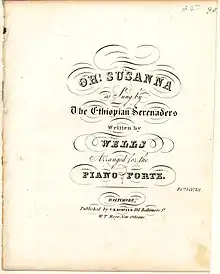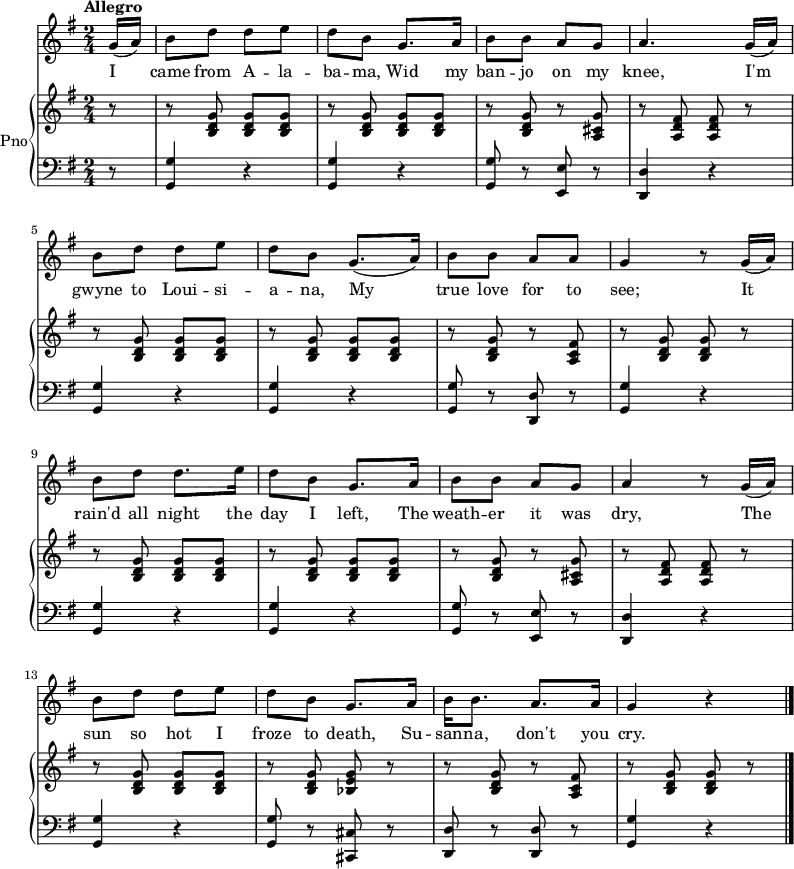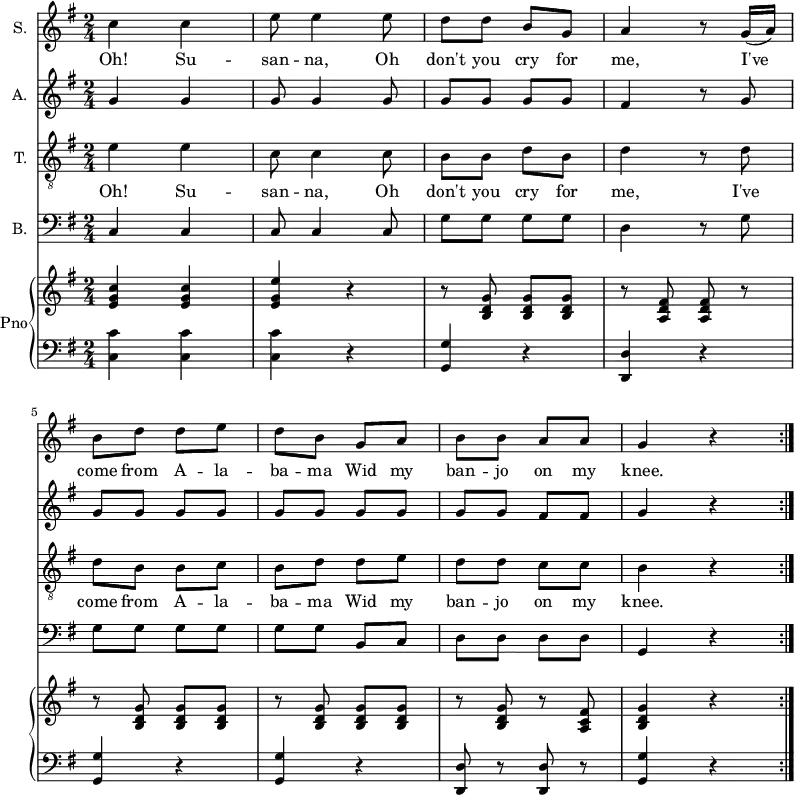Oh! Susanna (chanson)
Oh! Susanna est un blackface minstrel song écrit par Stephen Foster (1826-1864) et publié en 1848.

| Sortie | 25 février 1848 |
|---|---|
| Genre |
blackface minstrel song polka strophe à refrain (en) |
| Auteur | Stephen Foster |
| Compositeur | Stephen Foster |
Histoire
En 1846, Stephen Foster s'installa à Cincinnati, Ohio où il devint comptable dans l'entreprise de steamships de son frère. C'est là qu'il écrivit Oh! Suzanna, probablement pour le social club (en) de ses employés[1] - [2]. La chanson fut créée par un quintette au Andrews' Eagle Ice Cream Saloon de Pittsburgh, Pennsylvanie le [3]. La chanson fut publiée le par W. C. Peters & Co. à Cincinnati[4]. La chanson fut reprise par d'autres troupes de minstrel, et, comme c'était l'usage à l'époque, nombreux furent ceux qui s'attribuèrent la chanson pour jouir du copyright ; entre le et le , Oh! Suzanna a été copyrightée au moins vingt-et-une fois[2]. Foster ne gagna que 100 $ (soit 2 653 $ de 2012[5]) pour la chanson[6], mais sa popularité amena l'éditeur Firth, Pond & Company (en) à lui offrir deux cents par exemplaire vendu[2]. Stephen Foster devint ainsi le premier auteur de chansons américain à vivre de ses chansons[7] - [8].
Chanson
Oh! Suzanna fait la synthèse de plusieurs traditions musicales. La première ligne évoque un banjo, instrument de musique d'origine africaine, mais le rythme est celui d'une polka, dont la mode venait juste d'arriver d'Europe[3] - [9]. Glenn Weiser estime que la chanson est influencée par une chanson plus ancienne, Rose of Alabama, signée Silas Steele et datée de 1846, avec qui elle a des points communs dans la mélodie et la structure musicale[10].
Les paroles relèvent en grande partie du non-sens[2] (premier couplet : « It rain'd all night the day I left, The weather it was dry, The sun so hot I froze to death... », etc.)
C'est l'une des rares chansons de Foster à utiliser le mot « nigger » (avec Old Uncle Ned et Oh! Lemuel), dans le deuxième couplet.
Popularité et adaptations
Oh! Suzanna n'est pas seulement l'une des chansons les plus célèbres de Stephen Foster[12], c'est aussi une des chansons des États-Unis les plus connues[13]. Aucune chanson n'avait dépassé les cinq mille ventes aux États-Unis, Oh! Suzanna a dépassé les cent mille[14].
Après sa publication, la chanson devint l'hymne officieux des forty-niners[12], avec de nouvelles paroles qui évoquaient le voyage en Californie avec un washpan sur les genoux[15].
Enregistrements notables
En 1955, un novelty recording (en) interprété par The Singing Dogs (en) atteignit la 22e place du Billboard Pop Singles[16]. Une version humoristique de Oh! Suzanna figurait sur l'album Turn! Turn! Turn! de The Byrds en 1965.
En 2012 Neil Young interpréta une version rock avec son groupe favori Crazy Horse sur l'album Americana
Dans la culture
![]() Sauf indication contraire ou complémentaire, les informations mentionnées dans cette section proviennent du générique de fin de l'œuvre audiovisuelle présentée ici.
Sauf indication contraire ou complémentaire, les informations mentionnées dans cette section proviennent du générique de fin de l'œuvre audiovisuelle présentée ici.
![]() Sauf indication contraire ou complémentaire, les informations mentionnées dans cette section peuvent être confirmées par la base de données IMDb.
Sauf indication contraire ou complémentaire, les informations mentionnées dans cette section peuvent être confirmées par la base de données IMDb.
- La Petite Maison dans la prairie (saison 4 épisode Les Loups) : chantée par Laura Ingalls, ses deux sœurs et Andy Garvey.
- 2013 : Médecin de campagne - dans la version de VOF de Kunst.
- 2016 : Florence Foster Jenkins - version originale (piano et voix)
Liens externes
- Ressource relative à la musique :
Notes et références
- (en) Stephen Foster song book : original sheet music of 40 songs, New York, Courier Dover Press, , 181 p., fac-similé (ISBN 0-486-23048-1 et 978-0-486-23048-1, OCLC 153650439), p. 177.
- (en) « Foster Stephen C(ollins) », dans Baker's Biographical Dictionary of Musicians, (lire en ligne).
- (en) Daniel Zwerdling, « Stephen Foster », NPR Weekend All Things Considered, sur HighBeam Research, NPR, (consulté le ).
- « Susanna », sur www.stephen-foster-songs.de (consulté le ).
- (en) « Consumer Price Index (Estimate) 1800-2008 », sur www.minneapolisfed.org (consulté le ).
- (en) Greg Cahill, « Oh! Stephen Foster », sur HighBeam Research (en), Pacific Sun, (consulté le ) « But popularity didn't translate into success. His ebullient "Oh! Susanna" became the theme song of the Gold Rush, but Foster earned just $100 for that hit because crooked publishers failed to pay his royalties. »
- (en) Rusty Marks, « ON TELEVISION: ; Stephen Foster: Quintessential songwriter lived in music, died in ruin », sur HighBeam Research (en), Sunday Gazette-Mail, (consulté le ) « The song, written in 1847, soon spread throughout the country. Foster decided to become a full-time songwriter, a vocation no one had bothered to pursue until then. »
- (en) « Pittsburgh Native Son and Songwriter Stephen Foster to be Inducted Into Nashville Songwriters Hall of Fame Oct. 17 », sur HighBeam Research (en), US Fed News Service, Including US State News, (consulté le ).
- (en) Terry Gross, « The Lyrics And Legacy Of Stephen Foster », Fresh Air, sur HighBeam Research, NPR, (consulté le ) « Mr. EMERSON: I think that Stephen Foster really did create popular music as we still recognize it today. He did it because he took together all these strands of the American experience. That song is extremely Irish in its origins, just as other songs are extremely African-American, just as others are extremely Italian and operatic, or sometimes German, and even Czechoslovakian. For instance, the beat of "Oh! Susanna" is the beat of a polka. He's clearly effectively merged them into a single music. And I think he merged them in way that appeals to the multicultural mongrel experience of America in its history and culture. »
- (en) Glenn Weiser, « Oh! Susanna by Stephen Foster - Likely Origins »(Archive.org • Wikiwix • Archive.is • Google • Que faire ?), sur www.celticguitarmusic.com (consulté le ).
- (en) Bruce Benward et Marilyn Nadine Saker, Music in Theory and Practice, vol. 1, Boston, McGraw-Hill, , 7e éd., 369 p. (ISBN 0-07-294262-2 et 978-0-07-294262-0, OCLC 135031517), p. 37.
- (en) Tad Tuleja, « Oh, Susanna », dans New York Public Library Book of Popular Americana, New York, Macmillan General Reference, coll. « A Stonesong Press book », , 464 p. (ISBN 0-02-861448-8 et 978-0-02-861448-9).
- (en) « Memorabilia Collection Honors Composer Musician Wrote 'oh, Susanna'.(East Zone) », sur HighBeam Research (en), The Cincinnati Post (Cincinnati, OH), (consulté le ).
- (en) « Stephen Foster Information Page », sur www.meetthemusicians.us (consulté le ).
- (en) Rege Behe, « Stephen Foster really did write songs the whole world sang », sur TribLIVE.com, (consulté le )
- (en) Joel Whitburn, Top Pop Singles : 1955-2008, Milwaukee, Wisconsin, Record Research, .

